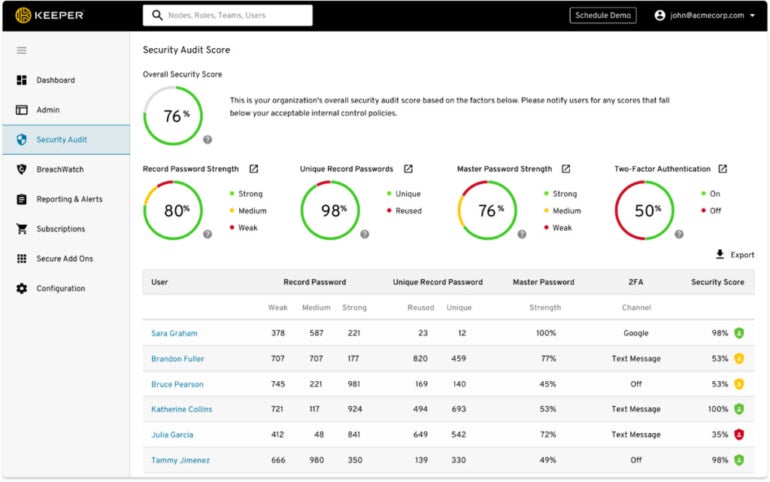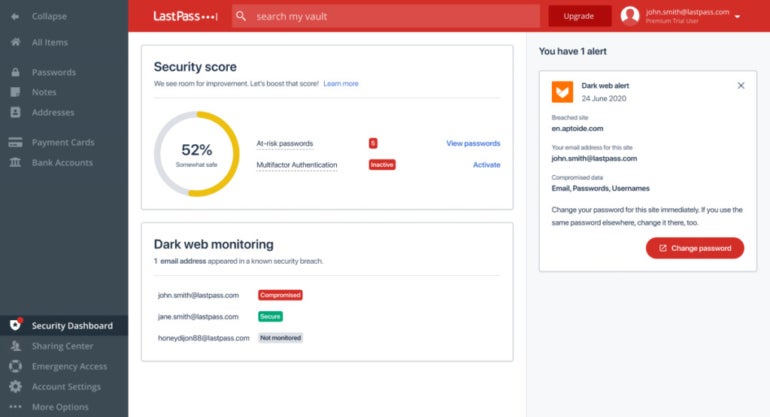Gone are the days of having to memorize passwords or write them on sticky notes. With the emergence of password managers, users can now conveniently organize and store all their passwords in one secure place.
Keeper and LastPass are two popular password managers that act as encrypted vaults for all your credentials. They also offer additional features such as password generation, multi-factor authentication and password sharing.
In this article, we compare Keeper vs. LastPass to see which one is best for you and your organization.
Both Keeper and LastPass meet the standards of a quality password manager, but Keeper shines for its impressive security and business-centered features. Meanwhile, LastPass’ free tier and easy-to-use interface can be great for those trying out their first password manager.
Due to its high-end encryption and reasonable pricing, 1Password may be a better option for individuals and businesses looking for a user-friendly, secure password management solution. 1Password, similarly, offers password sharing in the form of shared vaults, allowing users to share passwords with team members when necessary.
Recommended Alternative: 1Password SPONSORED
Keeper vs. LastPass: Comparison table
| Features | Keeper | LastPass |
|---|---|---|
| Zero trust principles | Yes | Yes |
| Multi-factor authentication (MFA) | Yes | Yes |
| Adherence to information security standards | Yes | Yes |
| Encryption | AES-256 (all levels) | AES-256 (vault level only) |
| Unlimited password storage and sharing | Yes | Yes |
| Business add-ons | Keeper Secrets Manager, Advanced Reporting and Alerts, Compliance Reports, KeeperChat | Advanced SSO and MFA |
| Supported Platforms | Windows, Mac, Linux, Android, iOS, Chrome, Firefox, Safari, Edge, Opera | Windows, Mac, Linux, Android, iOS, Chrome, Firefox, Safari, Edge, Opera |
| Starting price | Free or $2.92 per month | $3 per month |
Keeper and LastPass pricing
Keeper and LastPass have similar pricing for their individual subscriptions—with Keeper Personal at $2.92 per month and LastPass Premium at $3 per month, both billed annually. For Family plans, LastPass is more affordable at $4 per month than Keeper’s $6.25 per month.
For their business plans, Keeper and LastPass offer comparable prices, but Keeper presents more options:
- Keeper’s Business Starter plan for $2 per user, per month, is good for up to 10 people and a minimum of five users.
- Keeper’s Business plan priced at $3.75/user per month is good for small-to-medium sized businesses.
- Keeper also has the Enterprise plan that offers customized bundles and pricing.
In comparison, LastPass offers a Teams plan at $4 per user monthly, for 50 users or less. For more users, LastPass also provides a Business subscription at $7 per user monthly that allows for unlimited users.
LastPass and Keeper both offer free tiers, however, features are limited compared to their paid subscriptions. Keeper’s free version is only available for use on a single, mobile device. As far as discounts, Keeper offers a generous 50% discount for students and a 30% discount to former military and their family, first responders, law enforcement and healthcare workers.
Both offer free trials, with Keeper offering 30-day trials to all their plans and LastPass having a 30-day trial for its Single and Family tiers, and 14-day free trials for its Teams and Business subscriptions.
Feature comparison: Keeper vs. LastPass
Figure A

Zero trust and multi-factor authentication
Keeper and LastPass both employ a zero-trust security model, meaning they never assume users are who they say they are. Instead, users are constantly verified through multiple layers of security.
In terms of two-factor authentication, LastPass and Keeper offer several methods, including biometrics, one-time codes and push notifications. However, LastPass’s multi-factor authentication support is often limited or unavailable when federated login is used, while Keeper supports consistent MFA access via SSO Connect.
Adherence to information security standards
ISO27001 and SOC2 are two of the most popular standards for information security. ISO27001 checks if a system has an effective information security management system (ISMS), while SOC2 ensures that providers store and process customer data securely. These certifications are important indicators of the security and quality of a password manager.
Thankfully, both Keeper and LastPass have achieved certifications for these standards. It is worth mentioning that out of the two, Keeper has enjoyed a longer period of SOC2 and ISO27001 certification.
Encryption and other credential management features
Keeper and LastPass both employ 256-bit AES encryption; however, LastPass only supports encryption at the vault level, while Keeper supports encryption at multiple levels.
Both password managers alert users when their login credentials may have been breached. Keeper offers a feature called BreachWatch, which alerts users when stolen usernames and passwords match the user.
In contrast, LastPass offers a dark web monitoring feature (Figure B) that evaluates all stored email addresses in vault items. It immediately alerts users if any client email addresses are found in the database of breached credentials.
Figure B

In December 2022, LastPass admitted to a severe data breach when an unknown malicious actor accessed a cloud-based storage environment using the credentials of a LastPass employee. The intruder took a backup copy of customer vault data.
LastPass assured users that the encrypted files are secured with military-grade 256-bit AES encryption and can only be decrypted with their master password, which the attacker cannot access. LastPass has since taken steps to improve its security measures and has encouraged users not to reuse their master password on other websites.
Both LastPass and Keeper have excellent data protection and security features on paper. However, Keeper’s superior MFA support, its history of favorable third-party certifications, and LastPass’ recent data breaches gives Keeper the edge.
General password management features
Keeper and LastPass have robust administrative controls, allowing users to easily add, edit and delete passwords as needed. They both allow importing passwords from other applications, such as Google Password Manager. In their premium versions, Keeper and LastPass also offer unlimited device access, password sharing and priority 24/7 customer support.
Both password managers have emergency access that allows a loved one or a designated user to access the primary account holder’s information if something happens to them.
We get unlimited password storage and unlimited secure cloud backup in Keeper and LastPass. In addition, both managers are able to generate random secure passwords, which saves you time from thinking about combining numbers, texts and symbols for better security.
While they carry similar features, there are differences between Keeper and LastPass. For example, LastPass users can turn off the password manager for specific sites, while Keeper users cannot. This is advantageous if there are specific sensitive websites where users prefer to remember their passwords rather than use a password manager.
Business add-ons
Keeper offers a few more options than LastPass when it comes to business-specific add-ons. Its business add-ons include the Advanced Reporting and Alerts Module, Compliance Reports, the Keeper Secrets Manager, secure file storage and sharing and private hyper-secure messaging via KeeperChat.
LastPass does allow you to purchase two add-ons for their Business tier: Advanced SSO for $2 per user monthly and Advanced MFA for $3 per user per month.
Supported platforms
Keeper and LastPass include support for a wide range of platforms. The two password managers are available on Windows, Mac, Linux, Android, iOS, Chrome, Firefox, Safari, Edge and Opera.
Keeper pros and cons

Pros of Keeper
- Offers a free version.
- Offers a wide range of features, including auto-fill, two-factor authentication and password sharing.
- User-friendly interface.
- Compatible with multiple client devices and formats, including desktop, mobile, browser and command line.
- Encrypts user data with military-grade AES 256-bit encryption and multiple layers of security.
- Allows users to generate strong passwords.
- Easy to share and sync logins among multiple devices.
- Includes dark web monitoring.
Cons of Keeper
- Advanced two-factor authentication is not available in Business Starter and Business plans.
- Single sign-on (SAML 2.0) authentication is only available in the enterprise plan.
LastPass pros and cons

Pros of LastPass
- Offers a free version, in addition to premium subscriptions.
- Offers over 1,200 pre-integrated SSO apps.
- Easy-to-navigate user interface.
- Allows users to generate strong passwords.
- Easy to share and sync logins among multiple devices.
Cons of LastPass
- Security concerns after recent data breach.
- Customer support could be improved.
- It can be expensive for larger organizations.
Methodology
This article was originally written by Kihara Kimachia and was updated by Luis Millares. Both Keeper and LastPass were analyzed in terms of their features, price and value for money. We also carefully assessed how these features translated into real-world benefits for specific users.
Should your organization use Keeper or LastPass?
When deciding between Keeper and LastPass, the essential factor to consider is the security and usability of each service. Keeper is known for its cutting-edge security, two-factor authentication and government-grade encryption. It also offers useful features, such as password sharing and a secure digital vault.
LastPass also comes with quality security features, offering two-factor authentication and a password generator. It also features password auditing, a secure digital vault and the ability to share passwords with other users.
In terms of cost, LastPass has a win over Keeper in having a dedicated free version. However, Keeper does provide very generous discounts to students, military and first responders.
Overall, Keeper’s superior data protection, lack of reported data breaches and business add-ons make it the better choice over LastPass. Its service is also better suited for large or small businesses, government agencies and enterprises. LastPass could be a better fit for those looking to try out a password manager for the first time.

